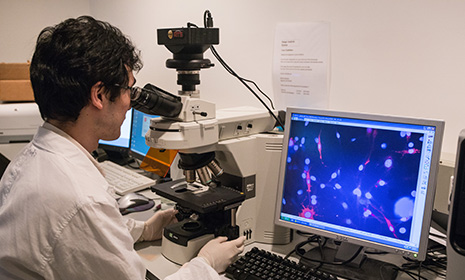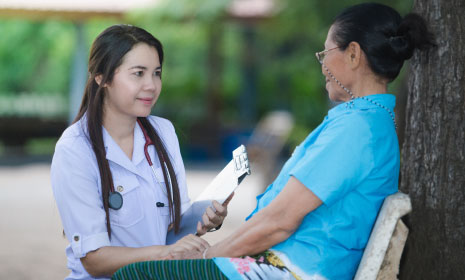HKU researchers report high influenza vaccine effectiveness in Hong Kong, 2017-18 winter
Hong Kong is currently experiencing its winter influenza season. According to our past research1, each year in Hong Kong, an average of 12,700 respiratory hospitalizations and 431 respiratory deaths are attributable to influenza. The exact impact varies from year to year, depending on the circulating strains, with influenza A(H3N2) epidemics tending to have the highest impact. This winter Hong Kong is experiencing an epidemic of influenza B including strains from the B/Yamagata lineage.
Influenza vaccines are the most widely used vaccines in the world, and around 700,000 doses were administered last year in Hong Kong according to the Centre for Health Protection.2 Some concerns have been raised about the effectiveness of influenza vaccines, following a recent report of low effectiveness of the vaccine against influenza A(H3N2) in Canada.3 The effectiveness of influenza vaccination varies by location, because of the different strains that are circulating in different parts of the world.
Research methodology and findings
The University of Hong Kong has been collaborating with Queen Mary Hospital and Princess Margaret Hospital to monitor influenza vaccine effectiveness each year for the past 9 years.4 Using well-established methods that are used in many other countries around the world to continuously monitor vaccine effectiveness, a research team comprising Professor Ben Cowling, Professor Malik Peiris and Dr Susan Chiu from The University of Hong Kong and Dr Mike Kwan and Dr CW Leung from Princess Margaret Hospital has enrolled children who are admitted to these hospitals with an acute respiratory illness including a fever and other respiratory symptoms, and determined which children had previously received influenza vaccination and which children were infected with influenza. By comparing vaccination status in the children with influenza or without influenza, the research team makes an estimate of the effectiveness of influenza vaccination in preventing hospitalization. Very similar methodology was used in Canada this season to estimate low influenza vaccination effectiveness of 17% against influenza A(H3N2) and moderate effectiveness of 55% against influenza B.3
Most recently, the research team conducted a hospital-based study in Hong Kong to estimate influenza VE for the winter of 2017/18. In this analysis, the team included data on 1078 children who were admitted between 4 December 2017 and 31 January 2018 with febrile acute respiratory illness and who were tested for influenza. There were 339 children with laboratory-confirmed influenza, among which 80% had influenza B. Using the data collected on these children, the team estimated that influenza vaccination effectiveness was 66%. Most vaccinated children had received the quadrivalent vaccine which includes a B/Yamagata strain, rather than the trivalent vaccine that does not include a B/Yamagata strain.
Professor Ben Cowling, Head of Division of Epidemiology and Biostatistics at the HKU School of Public Health and researcher at the WHO Collaborating Centre of Infectious Disease Epidemiology and Control, said: “These are the first local estimates of the performance of the influenza vaccine in Hong Kong this winter, and reassure us that the vaccine is very effective against the locally circulating strains.” Dr Susan Chiu, Clinical Associate Professor of HKU Department of Pediatrics and Adolescent Medicine, added: “These results indicate that influenza vaccination is effective and should be more widely used in children in Hong Kong. Looking forward, it is important for parents to get their children vaccinated in October and November each year, before the influenza season starts” Professor Malik Peiris, Chair Professor of Virology and Tam Wah-Ching Professor in Medical Science of HKU School of Public Health, further remarked: “The influenza vaccine tends to be more effective against influenza B and influenza A(H1N1) than against influenza A(H3N2), and that is consistent with these results.”
About the Research Team
The research was conducted by: Professor Benjamin J Cowling, Head of Division of Epidemiology and Biostatistics of WHO Collaborating Centre of Infectious Disease Epidemiology and Control, the School of Public Health, Li Ka Shing Faculty of Medicine, HKU; Dr Susan Chiu, Clinical Associate Professor of the Department of Paediatrics and Adolescent Medicine, Li Ka Shing Faculty of Medicine, HKU; Dr Mike Kwan and Dr CW Leung, Consultants of the Department of Paediatrics and Adolescent Medicine, Princess Margaret Hospital; Professor J. S. Malik Peiris, Tam Wah-Ching Professor in Medical Science and Chair Professor of Virology at the School of Public Health, Li Ka Shing Faculty of Medicine, HKU.
Researchers in Hong Kong have a world-class reputation in research on influenza viruses. Researchers in the School of Public Health HKU are supported by a large commissioned grant from the Health and Medical Research Fund, under the Food and Health Bureau of the HKSAR government. The School of Public Health, HKU, is designated as a WHO Collaborating Centre for Infectious Disease Epidemiology and Control, the first such centre at the University.
Media enquiries
Please contact Professor Ben Cowling (Tel: 3917 6711) of the School of Public Health, Ms Evelyn Chan (Tel: 3917 9244 / 9211 4197) or Ms Natalie Leung (Tel: 3917 9306/ 9131 2820) of Li Ka Shing Faculty of Medicine, The University of Hong Kong.
References
- Wu P, Presanis AM, Bond HS, Lau EHY, Fang VJ, Cowling BJ. A joint analysis of influenza-associated hospitalizations and mortality in Hong Kong, 1998-2013. Sci Rep. 2017; 7(1):929. https://www.nature.com/articles/s41598-017-01021-x
- Centre for Health Protection press release. http://www.info.gov.hk/gia/general/201706/22/P2017062200297.htm
- Skowronski DM, Chambers C, De Serres G, Dickinson JA, Winter AL, Hickman R, Chan T, Jassem AN, Drews SJ, Charest H, Gubbay JB, Bastien N, Li Y, Krajden M. Early season co-circulation of influenza A(H3N2) and B(Yamagata): interim estimates of 2017/18 vaccine effectiveness, Canada, January 2018. Euro Surveill. 2018; 23(5). http://www.eurosurveillance.org/content/10.2807/1560-7917.ES.2018.23.5.18-00035
- Cowling BJ, Chan KH, Feng S, Chan EL, Lo JY, Peiris JS, Chiu SS. The effectiveness of influenza vaccination in preventing hospitalizations in children in Hong Kong, 2009-2013. Vaccine. 2014;32(41):5278-84. https://linkinghub.elsevier.com/retrieve/pii/S0264-410X(14)01051-2

Professor Gabriel M Leung, Dean Li Ka Shing Faculty of Medicine, HKU (Left) and Professor Ben Cowling, Head of Division of Epidemiology and Biostatistics at the HKU School of Public Health,stated that influenza vaccine performs well according to the study of influenza vaccination effectiveness in these two months.








.png)
